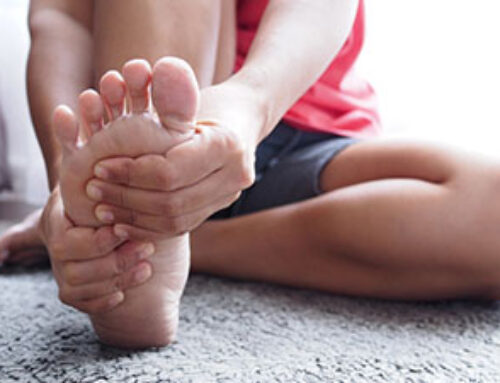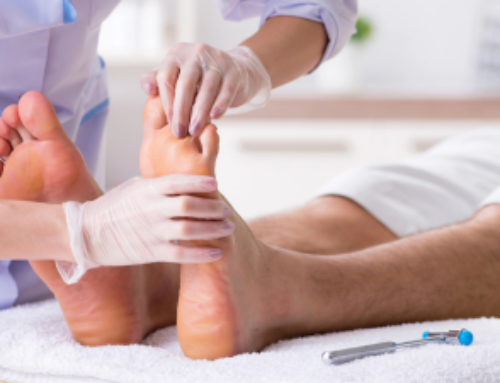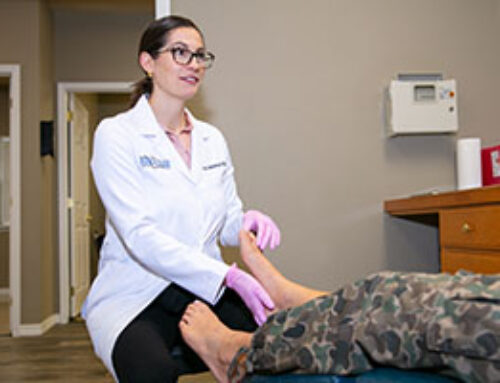Nerve damage is generally spoken of as a complication of diabetes but can also result from an injury. When damage to the nerves takes place, it is important to act to prevent Neuropathy from worsening. This is why the specialists at Metro Tulsa Foot and Ankle created this guide to help you recognize the warning signs and discover the steps you should take.
What are nerves?
Nerves are made up of fibers, called axons. Axons are covered with tissues that act as insulation. When these fibers are injured or damaged, Peripheral Nerve Damage can take place.
What is peripheral nerve damage?
According to the Mayo Clinic, “Peripheral nerves send messages from your brain and spinal cord to the rest of your body, helping you do things such as sensing that your feet are cold and moving your muscles so that you can walk.”
Peripheral Neuropathy is common in individuals over the age of 55 and refers to general diseases or malfunctions of the nerves as they try to carry messages from the brain and spinal cord to the rest of the body.
What are the symptoms of nerve damage?
Nerves that are more likely to be damaged are those in your arms, feet, and hands, though much of your body could be affected and cause uncomfortable or even painful sensations.
If you suffer from peripheral nerve damage, you may experience:
- Pain or discomfort in the feet or legs, including prickly, sharp pain or burning feet.
- Numbness and tingling in the feet.
- Sensitivity issues.
- Difficulty walking due to numbness and/or muscular deterioration.
- Itching
- Cramps
- Dry or cracked skin.
- Nausea, vomiting, or abdominal bloating after meals.
- Muscle weakness and loss of muscle tone in the feet and lower legs.
- Loss of balance.
- Changes in foot shape can lead to areas of increased pressure.
- Swelling of the feet and ankles.
- A buzzing sensation that feels like a mild electrical shock.
Who is susceptible to nerve damage?
The American Diabetes Association says approximately half of the people who have diabetes struggle with peripheral Neuropathy. But you don’t have to have diabetes to suffer from peripheral Neuropathy. Other causes of nerve damage might be injuries, infections, and even vitamin deficiency, as well as several different diseases such as:
- Autoimmune Disorders
- Chronic Kidney Disease
- HIV/Aids
- Shingles
- Hepatitis C
- Low levels of vitamin B1, B6, or B12.
- Metabolic disease
- Lead poisoning
- Underactive Thyroid Gland
- Bone Marrow Disorders
- Tumors
How is Peripheral Neuropathy diagnosed?
There are many ways to test if you are struggling from peripheral Neuropathy, such as:
- Imaging Scans – Imaging scans such as x-rays, CT scans, and MRIs are often used to look for sources of pressure on or damage to nerves.
- Electromyography – This test uses a very thin needle placed under the skin to measure the electrical activity of the muscle.
- Nerve Conduction Velocity Test – This test works to measure the speed that signals travel through the nerves.
- Nerve Biopsy – A nerve biopsy may be necessary to establish the cause of Neuropathy in some cases.
7 Treatments for Nerve Damage in Your Feet
-
Lifestyle changes to improve nerve damage symptoms.
Lifestyle changes won’t cure nerve pain, but changes can make you feel better and work to reduce any nerve pain you are suffering from. The specialists at Metro Tulsa Foot and Ankle Specialists suggest that you start by eating fruits and vegetables that are rich in B vitamins. Should you have diabetes, managing your blood glucose level by eating a proper diet is essential.
-
Orthotic devices
Orthotic devices work to provide proper arch, ball, and toe support; they help increase your stability to help prevent falls. In some cases, orthotic devices have also been known to ease pain and symptoms by stimulating the nerves and providing cushioning to areas that cause pain.
-
Surgical Treatment of Nerve Damage
In severe cases, some cases of Neuropathy require surgery, specifically cases that involve compression or entrapment of nerves by tumors or other similar situations. Surgery allows for the decompression of nerves, potentially reversing symptoms of numbness and tingling.
-
Extracorporeal Shockwave Therapy
Extracorporeal shockwave therapy can be used to assist in pain relief and restoration of mobility. Eight to twelve weeks after treatment is when you should expect the most significant degree of results and freedom from the associated chronic pain that plagues you.
-
Perineural Injection Therapy
Perineural Injection Therapy utilizes shallow, small injections along the superficial nerve path to reduce pain and inflammation.
-
Mineral Supplements
Nerves require magnesium and calcium for proper functioning. Supplements may be needed so that you are not relying on your diet alone.
-
Medications
There are a variety of prescription medications that can be used to alleviate neuropathy symptoms, such as anti-epileptic drugs, anti-depressants, and selective serotonin reuptake inhibitors.
What can I do at home to care for Neuropathy?
If you have Neuropathy, it is extremely important to take good care of your feet so that you lower your risk for developing sores or infections.
Proper foot care for Neuropathy should include:
- Wash your feet with warm water every day, ensuring that your feet are not only clean but completely dried after.
- Inspect your feet daily, looking for cuts, blisters, or other problems.
- Never go barefoot when walking or wear improper-fitting footwear.
- Wear thick, seamless socks to prevent irritation.
- Massage your feet to help improve circulation.
- Avoid excessive alcohol intake.
Anyone with a Neuropathy diagnosis should call a doctor if:
- Symptoms suddenly get worse
- The pain of Neuropathy becomes severe
- Pain or other symptoms spread to another area of the body
- You have sores or injuries on your feet
- You have swelling, a fever, or other signs of infection
How can Metro Tulsa Foot and Ankle Specialists help me?
When you suffer from nerve pain, mobility is difficult. Nerve pain can be debilitating and cause unnecessary problems. If you would like to get relief today, request an appointment. We are here to help!
Subscribe to stay up-to-date on news and tips from us.





